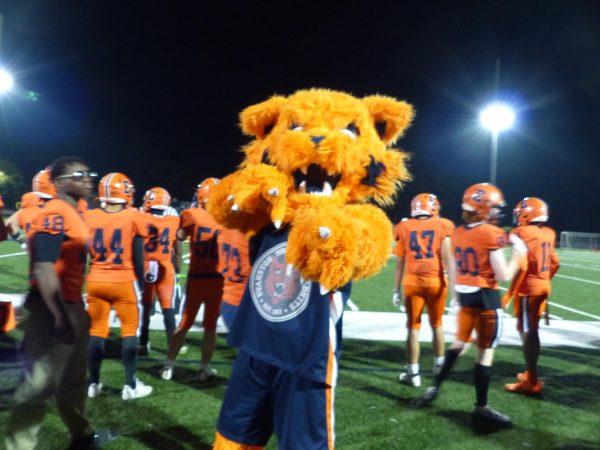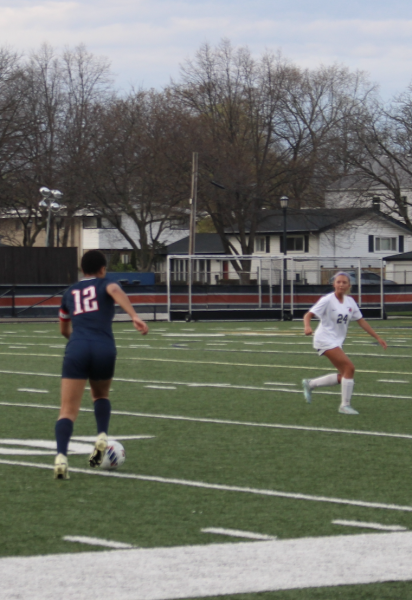Opinion | IHSA Should Create a Policy to Address Racism in Competition
When I first started playing football at ETHS, it was an exciting experience. I had to wait an extra half-a-year to actually start playing games, and one of the moments that stood out to me was from the third week when we were going to play New Trier.
A main theme throughout that week was discipline. All week, I heard messages from coaches and other players—“Don’t let them get in your head,” “Don’t let them steal the game from us because of our anger,” and, “No matter what is said, come talk to a coach, and let us take care of it.”
While, luckily, nothing hostile happened that week regarding being called slurs, this season against Libertyville, players on the JV team experienced that very incident.
That game brought a lot of passion out of both teams as a whole. Even before that moment, our team was extremely zealous, which resulted in a lot of personal fouls throughout the season, even if other teams did the same things as us. Yet, there’s a difference between heated, spirited competition and the use of a racial slur.
Personally, hearing my teammates’ being called the n-word, I mostly just felt frustrated. I knew that there was nothing that we could do besides tell our coaches what happened. Even after coaches and officials had a conversation about it, nothing happened. Even if no penalty is called, acting as if a white player calling their opponents the n-word was common, and acting as if it should warrant the same amount of conversation as a coach arguing a penalty, was disappointing.
In this day and age, it is becoming easier and easier to find evidence of people saying the n-word, and while more people are being called out, meaningful action often isn’t taken against these people. Some examples are Gina Rodriguez from Jane, the Virgin, who said it during an Instagram Live and country star Morgan Wallen, who saw his sales increase after saying the n-word.
Many of us can remember the first time we heard a bad word or a slur. For me, hearing the n-word for the first time is ingrained in my head, because it was a word outside my vocabulary that I was excited to learn about. But, then, after educating myself and learning about the history of the word, it was a word I decided to never use.
While this is probably a very strong moment in someone’s head, hearing someone use it against you or someone who shouldn’t be saying the word says it, sticks in your head even more.
This is why the Illinois High School Association should take meaningful action to back up their beliefs. They include, ‘The IHSA believes in respect, appreciation, and acceptance of diversity,” “integrity and honesty are non-negotiable,” and, “sportsmanship is a core value.’
To really showcase meaningful action and growth, that we as a society like to say we’ve had since 2020’s summer of unrest, the IHSA needs to go beyond their beliefs and make a policy to address these incidents, as the most growth comes out of being uncomfortable and learning.
Writing a policy around racial harassment would be uncomfortable since it would serve as an admittance that it is a problem that must be addressed, but it would improve the quality of games across the state and ensure protection for all student-athletes.
Your donation will support the student journalists of the Evanstonian. We are planning a big trip to the Journalism Educators Association conference in Philadelphia in November 2023, and any support will go towards making that trip a reality. Contributions will appear as a charge from SNOSite. Donations are NOT tax-deductible.






Dr. Angela James • Dec 23, 2021 at 8:41 am
Thank you for using your voice and platform to highlight the systemic acceptance of racism. I agree that the governing body should hold players and schools accountable for these unacceptable behaviors. Competitive sports have always been marred by this type of ugliness. When will change come? And who will pick up the baton of social justice to advocate for our players?
Mirah Anti • Jan 8, 2022 at 8:35 pm
I second Dr. James and applaud your voice on this issue. I am pretty certain that thanks to the leadership of our very own AD, IHSA does in fact have a fairly new Hate Speech policy. In addition, area schools are working together to create equity workshops for all athletic teams.